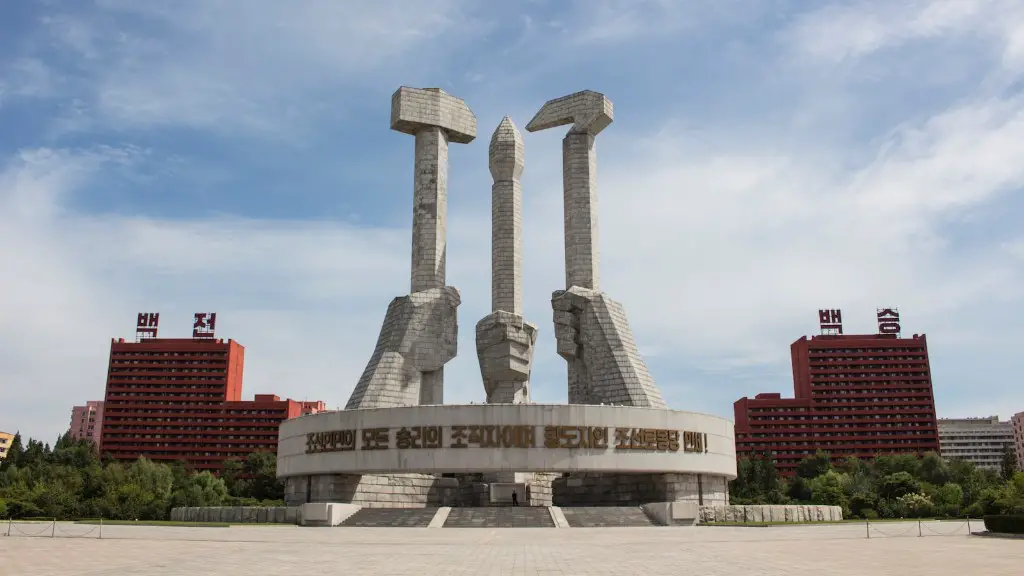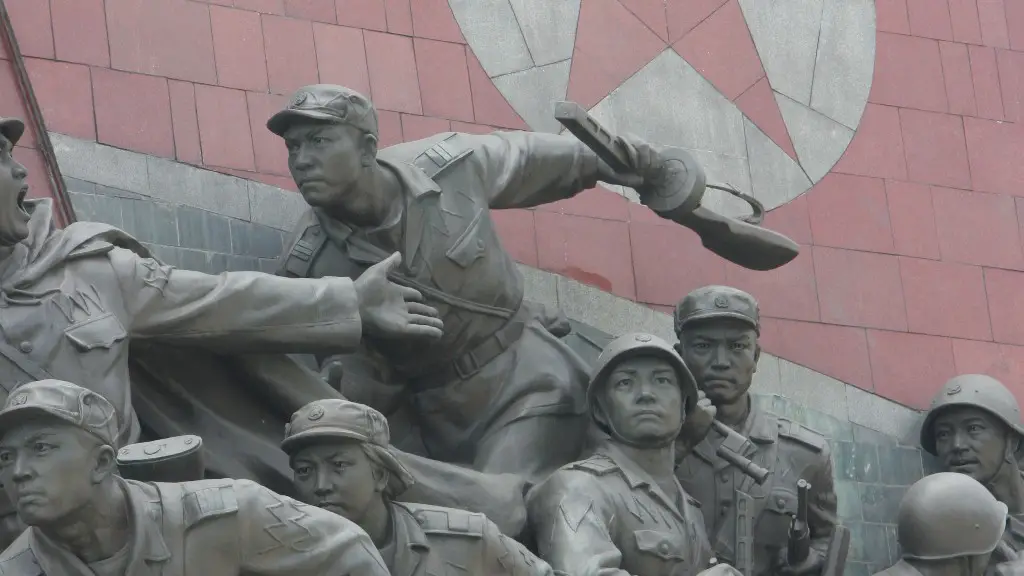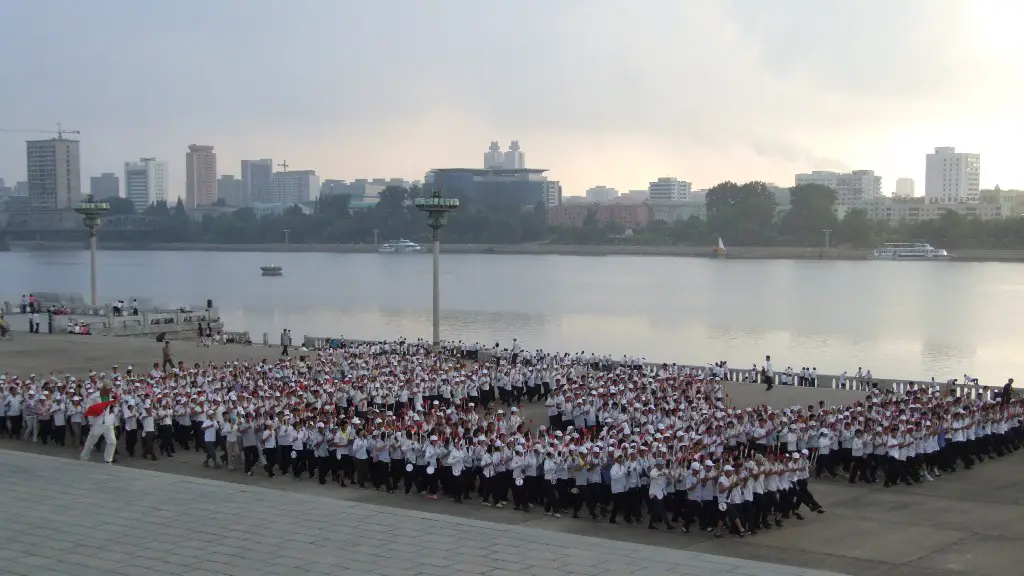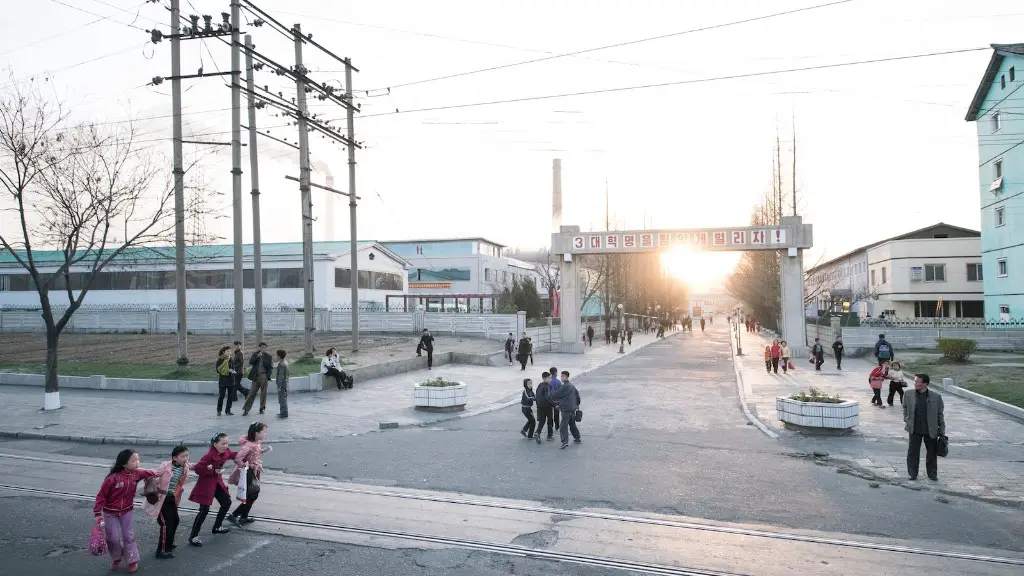The news of the United States and North Korea continues to dominate headlines: from the enactment of sanctions, to the successful test launches of nuclear missiles. It’s no wonder that tensions between North Korea and the rest of the world have never been higher. But what is really going on? This article will examine the current state of affairs between the two countries, as well as provide some insight into the mindsets of those involved.
The roots of today’s tension between the U.S. and North Korea can be traced back to the Korean War, when the U.S. sought to prevent the spread of communism in the region. Subsequently, the two countries have had a history of strained relations. Past U.S. administrations have attempted to outreach to North Korea, but none have been successful. After years of talks, denuclearization, economic sanctions and broken promises, it seems that North Korea is as determined as ever to become a nuclear power.
Currently, North Korea is continuing its pursuit of nuclear capabilities in the form of missile tests. Though the United Nations has enacted multiple successive sanctions, North Korea appears undeterred as it continues it missile testing program. This has been met with strong opposition from the United States, which has threatened further sanctions if North Korea does not comply.
One might wonder why North Korea is so eager to obtain nuclear weapons despite the economic cost and international scrutiny it entails. In truth, North Korea has long seen its nuclear program as key to its survival. Its leaders believe that the only way to protect the country’s sovereignty is to have nuclear capabilities to deter other countries from attacking or invading.
The U.S., meanwhile, is wary of the threat posed by a nuclear-armed North Korea. The U.S. is particularly concerned about the possibility of North Korea supplying nuclear weapons to other hostile countries or terrorist organizations. This fear has been reinforced by the US intelligence reports suggesting North Korea has developed a nuclear weapon small enough to fit on a intercontinental missile.
The situation is further complicated by the the views of China and South Korea towards North Korea, as both countries are key players in the region. Both China and South Korea hope to avoid a conflict with North Korea and have advocated for more peaceful solutions. While China has occasionally threatened North Korea with sanctions, it continues to provide economic and diplomatic support for North Korea, which further complicates matters.
As the situation is further complicated by the actions and views of countries in the region, the future of US-North Korea relations looks uncertain. It is clear that the situation is one of complexity, with multiple parties involved all vying for their own interests. Thus, it is hard to predict exactly what the future holds.
The Role of Sanctions
Sanctions have long been a tool employed by the United Nations in a bid to curb the development of North Korea’s nuclear program. The most recent round of sanctions have been the most severe yet, with the United Nations Security Council unanimously voting for the package of measures. The sanctions target North Korea’s primary sources of income, including its exports such as seafood, coal, and textiles. The sanctions are meant to curb North Korea’s access to foreign currency, largely from its exports, thus making it harder for the country to finance its nuclear program.
The effectiveness of sanctions has also been called into question, with some experts arguing that North Korea is resilient enough to overcome the effects of sanctions. While it is true that North Korea has been able to survive under the pressure of sanctions, it is also true that the recent sanctions package has severely weakened North Korea’s economy. In fact, reports suggest the economic growth in North Korea has slowed significantly after sanctions were imposed.
Although experts are divided on their views of the effectiveness of sanctions, it is clear that sanctions remain an important tool in the diplomatic arsenal of the United Nations. How long the sanctions will remain in place, as well as their ultimate effects, remain to be seen.
The Impact on South Korea
The continued tension between the United States and North Korea has had an impact on South Korea. North Korea’s aggression has been met with counter-measures from the United States, such as increased military presence and joint military drills with South Korea. This is in addition to the economic impact of the sanctions, which has hurt many South Korean businesses.
The South Korean government is particularly fearful of the threat posed by North Korea’s nuclear weapons, as are its citizens. The South Korean people are also frustrated by the lack of progress in the region despite years of negotiations and summits. This has spilled over into public opinion towards South Korea’s leaders, with some seeing them as unable to defuse the situation. Consequently, some South Koreans are calling for the government to take a more proactive stance towards North Korean aggression.
South Korea is a key U.S. ally in the region and its people have long sought peace between the two Koreas. In recent years, there have been talks of increased economic cooperation between the two countries, but so far little progress has been made. South Koreans groan after another failed promise of peace, as they find themselves trapped in a cycle of tension.
The Impact On Citizens
The back-and-forth between the US and North Korea has had a deep impact on the citizens of both countries. North Koreans have had to endure the focus of the international spotlight, coupled with the deprivation caused by the sanctions. This has significantly increased the levels of poverty in the country, as well as lowered the quality of life for the citizens of North Korea. This can be seen in reports of lowered life expectancy and a decrease in food production.
In the US, citizens are on edge due to the continued threats posed by North Korea. Tension has been further heightened by the fact that North Korea possesses a nuclear weapon small enough to fit on an intercontinental missile. This fear has been compounded by US President Donald Trump’s combative rhetoric towards North Korea, which his critics say have led to an even more precarious situation.
As the tensions between the US and North Korea remain unresolved, the possibility of a confrontation looms larger with each passing day. For the citizens of both countries, this means a heightened sense of uncertainty. As the world waits for a resolution, the future looks bleak for the citizens of US and North Korea.
Response From The International Community
The international community has been quick to respond to the ongoing drama between the US and North Korea. The United Nations has enacted sanctions against North Korea, both as a way to de-escalate the situation and as a way to show its disapproval of North Korea’s nuclear ambitions. Other nations, such as China and South Korea, have also sought to reduce tensions in the region through various diplomatic measures.
It is important to note that many world leaders, including President Trump, have begun to soften their stance towards North Korea in recent months. There has been an increased willingness to negotiate and find a diplomatic solution to the situation, which could lead to an eventual resolution. However, it is also important to note that there are still numerous disagreements between the nations involved, which means a peaceful solution is still far from being realized.
International bodies, such as the United Nations, must now use their influence and authority to guide the countries involved in the conflict towards a peaceful resolution. This entails both dialogue and negotiations, as well as active mediation from the United Nations. It is also important for the international community to apply constant pressure on North Korea to ensure it continues to comply with agreements and negotiations.
The Roles of China and Russia
The roles of China and Russia in the ongoing conflict between the US and North Korea are complex at best. Both China and Russia are major players in the region and have sought to maintain a delicate balance between the two countries. On the one hand, Russia and China have vehemently opposed North Korea’s nuclear ambitions and both have supported the various rounds of UN sanctions against the country. On the other hand, both countries have sought to reduce tensions between the US and North Korea through diplomatic means.
It is important to note that both China and Russia have a vested interest in the conflict. For instance, both countries are keen to prevent a US-led coalition from establishing military control over the region. As such, China and Russia have argued for more diplomatic solutions to the conflict and have called for negotiations and talks between the US and North Korea.
It is clear that the situation between the United States and North Korea is complex and may take years to resolve. China and Russia will continue to be major players in the region and their influence could be the deciding factor in the conflict. For now, the stakes are high and it remains to be seen which way the situation will go.
The Role of Nuclear Disarmament
Nuclear disarmament is a key issue in the ongoing dispute between the United States and North Korea. The United Nations Security Council has called on North Korea to get rid of its nuclear weapons program, while the United States has threatened further sanctions if North Korea fails to comply. For its part, North Korea has long held that it will not give up its nuclear weapons program and has argued that it needs the weapons for self-defense.
However, it appears North Korea may be willing to consider some form of nuclear disarmament in exchange for an easing of sanctions. This has been seen as a potential breakthrough in US-North Korea relations and could be the basis for a resolution. Yet, the US and North Korea have still not come to an agreement on the matter and it remains to be seen if any meaningful progress on the matter can be made.
Nuclear disarmament, if successful, could have far-reaching implications for US-North Korea relations and could potentially lead to peace, stability and a more prosperous future for the two countries. Yet, it is also important to note that the talks will involve difficult negotiations and hard compromises on both sides. For now, the international community can only hope that a deal can be made that will lead to a more peaceful future.
Outlook For The Future
The current situation between the US and North Korea is one of complexity and confusion. On the one hand, there is the desire for dialogue and diplomacy, as well as the hope for a peaceful resolution. On the other, there is a growing sense of urgency as the two nations remain deadlocked in a standoff that could have devastating consequences.
As of now, the outlook for the future is uncertain. It is clear that negotiations are ongoing and that both sides are slowly making progress, albeit at a slow pace. Whether or not a peaceful resolution can be achieved remains to be seen. For now, the international community can only hope that diplomacy prevails and that both sides will be able to find a way to peacefully resolve their differences.





